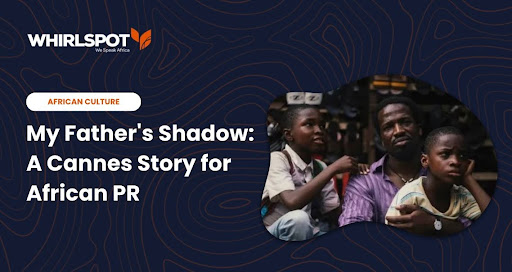For decades, African PR has been told to “simplify” its stories for the world, to explain itself, to reframe complexity in ways palatable to Western audiences. This year at Cannes, a film called My Father’s Shadow proved the opposite: that depth sells, truth travels faster than hype, and an unapologetically African story can outshine even the most polished global campaigns.
Directed by Akinola Davies Jr. and co-written with his brother Wale, it became Nigeria’s first official Cannes selection in 78 years. It was a milestone that instantly shifted the conversation around African cinema. Semi-autobiographical, it explores masculinity, memory, and identity against the backdrop of Nigeria’s tense 1993 political landscape, without diluting its essence for international audiences.
This was not a film chasing validation. It was a story anchored in place, voice, and experience. It was a reminder that when we trust our own narratives, the world listens.

How ‘My Father’s Shadow’ at Cannes Redefines African PR
Africa has over 1.4 billion people and a combined GDP of $3 trillion, yet it accounts for less than 1 percent of the global PR industry’s revenue. Too often, African storytelling in international media has leaned on hardship, exoticism, or flattened cultural symbols. My Father’s Shadow offered something different — a textured, personal lens that refused to be reduced.
Told through the eyes of two young boys, the political unrest of 1993 is never explained in full. Instead, it is felt in the stiffened silence between adults, the wary glances at soldiers, and the whispered urgency of passing cash. The camera never lectures. It trusts the audience to sense the danger. This choice to keep the frame intimate made the story both universal and deeply rooted.
And Cannes noticed. So did the global press.

The Ripple Effect on Authentic Storytelling
The selection did not just elevate the filmmakers. It shifted the perception of Nigerian cinema, demonstrating that African productions can meet the highest technical and artistic benchmarks without compromising their identity. It echoed earlier moments such as Mati Diop’s Atlantics, Wanuri Kahiu’s Rafiki, and Burna Boy’s Twice As Tall. Each proved that authenticity paired with craft can travel further than imitation ever will.
There is a lesson here for PR beyond film. Prestige platforms do not demand that you sand down your edges. They reward stories that carry their culture unapologetically while still speaking to human truths.
Takeaways for African PR
When African stories succeed on a global stage without compromise, they do more than win awards. They shift assumptions, create curiosity, and spark dialogue. They invite the audience to step into a reality they may never have known, without being spoon-fed. They let the silences, the textures, and the untranslatable moments do their work.
My Father’s Shadow is proof that the world is not asking Africa to explain itself. It is asking Africa to keep telling the truth.
Final Thought
At WhirlSpot Media, we believe in this kind of storytelling — the kind that trusts its audience, honours its roots, and still resonates everywhere. Our work starts with the same principle: let the truth carry the story, and the audience will follow.
Learn more about how WhirlSpotmedia can help your brand tell its authentic story.




